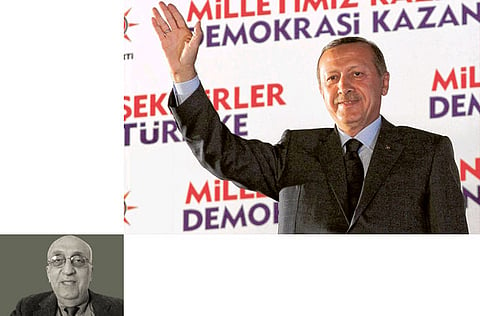Impact of Turkish power politics
Erdogan's clipping of the military's wings could affect the bloody turmoil in neighbouring Syria

The timing was unbelievable. The surprise resignation of Turkey's top military leaders could not have come at a better time for the Arab Spring which started six months ago and is still facing uphill battles with military-controlled governments in various Arab states, particularly in Syria and Yemen.
The military leaders, including Turkey's senior commander and the leaders of the navy, army and air force, who have apparently lost lots of political power, resigned en masse reportedly in protest over the sweeping arrests of dozens of generals and other civilian suspects believed to be involved in a conspiracy aimed at overthrowing the civilian government led by Recep Tayyip Erdogan.
Erdogan, who came to office in 2002, has built his Justice and Development Party (AKP) into "a powerful political force", and in the process has managed to roll back the military's political power substantially.
Military leaders have been able to depose four governments in Turkish history and have executed the country's first democratically elected prime minister, Adnan Menderes. His AKP won 50 per cent of the vote in last June's election, controlling 326 of the 550 seats in parliament.
Whether Turkey will now serve as a model for Arab revolutionaries remains to be seen, but in the long-run it is generally believed that Egypt may regain its historic leadership role in the Arab world should it proceed steadfastly as a strong, democratic state.
But the immediate concern is how the sudden turn of events in Turkey will affect the bloody turmoil in neighbouring Syria since the two countries seemed to have been working together congenially until lately when the Arab Spring engulfed this strategic Arab country.
In fact, the first Arab military ruler here was a Syrian general called Hosni Al Zaim, said to be "the most colourful Syrian dictator", who took Kemal Ataturk, the founder of the modern Turkish republic, as a model. But his regime did not last long and in fact two other coups followed his with the next few months.
What has been most puzzling about the growing uprising in Syria has been the brutality of the regime of Bashar Al Assad and the failure of most countries to deal with the worsening situation, be they western powers or regional states.
Turkey, for a start, has retreated from its growing relationship with Syria where its foreign minister had visited its Arab neighbour more than 60 times, and seemingly sided with the West.
Even the Arab League, representing 22 Arab states, has surprisingly failed to take a stand against the Syrian regime unlike what it did in Libya where its support to the leaders of the Libyan uprising opened the road for Nato military intervention.
US timidity
Most unexpected has been the timidity of the Obama administration, which has stopped short of calling on the Syrian president to step down. All that US President Barack Obama would say last Monday was to repeat his "strong condemnation of the Syrian regime's outrageous use of violence against its own people".
He also reaffirmed America's support for the "courageous Syrian people and their demands for universal rights and a democratic transition".
Secretary of State Hillary Clinton also highlighted "the brutality and viciousness" of the Al Assad regime, repeating that the US stands with the Syrian people and that "we condemn the Al Assad regime's violent campaign" and called on the Syrian president "to stop the slaughter now".
It remains to be seen whether the western powers are able to bring the bloody Syrian crackdown before the UN Security Council. Some Security Council members have reportedly refused to adopt the western position condemning the Al Assad regime. Interestingly, Russia has now indicated that it will not oppose a UN resolution critical of Syria's policies.
On the other hand, one serious hurdle that the Syrian regime has been successfully fomenting has been the absence of serious violence in Syria's key cities — Damascus and Aleppo — thereby lending faint support to Al Assad regime's position that all the turbulence is the result of instigation by armed gangs.
On the other hand, the plight of Hama has so far attracted world-wide attention since over 100 protesters have been killed earlier this week, rekindling memories of the massacre of some 10,000 Syrians in that city in 1982 during the presidency of Hafez Al Assad, the father of Syria's current president.
Syria's loss of Turkey's essential support has dented the legitimacy of Al Assad regime, a situation that may result in more bloodshed. The hope that Iran, the Syrian regime's only other regional ally, will come to its assistance appears far-fetched at the moment, adding to Syria's international isolation.
George S. Hishmeh is a Washington-based columnist. He can be contacted at ghishmeh@gulfnews.com
Sign up for the Daily Briefing
Get the latest news and updates straight to your inbox


